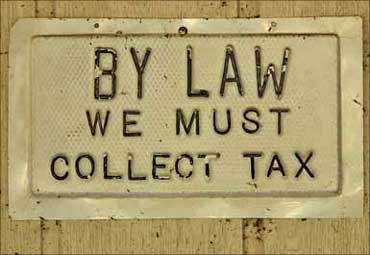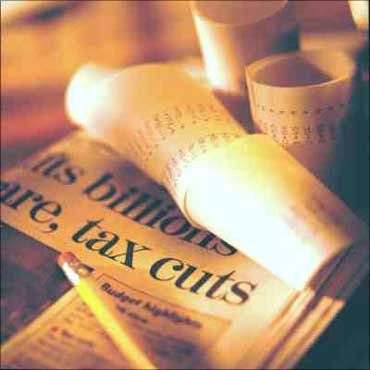Kuldip Nayyar in Mumbai
The 48-year-old Indian Income Tax Act is set to be replaced by a new Direct Tax Code from April 1, 2011.
The ball is already in play. A draft of the new Direct Tax Code has been released by the government for public debate. Comments and suggestions from taxpayers and other stakeholders will, the government says, be taken into consideration before enacting the final law.
FAQs on the revised code:
Under the direct taxes code (DTC) regime, what happens if a salaried employee withdraws money from his/her approved Provident Fund (PF)/Superannuation fund (SF) /Gratuity and other retrial benefit schemes? How will the DTC affect pension plans?
In the initial draft of DTC, the government has proposed to move to the exempt-exempt-tax (EET) basis of taxation for long-term saving schemes. That is, exemption granted at the time of contribution (making an investment) and accrual on such investments.
But at the time of withdrawal, such accumulations were proposed to be taxed. Under the revised discussion paper on DTC (RDP), released recently by the Government, it has been proposed to restore the exempt-exempt-exempt (EEE) basis of taxation for Provident Funds (Government, Recognised or Public), approved pension schemes, pure life insurance products and annuity schemes.
Accordingly, the withdrawal from approved PF/SF may continue to be not taxable at the time of withdrawal.
Further, the retirement benefits have also been proposed to be exempted from tax subject to limits. Benefits such as gratuity, leave encashment, commutation of pension (linked to gratuity), would be exempt subject to the limits to be prescribed.
Regarding pension schemes, where these schemes are administered by Insurance Regulatory and Development Authority (Irda), these schemes may get the benefit of EEE basis of taxation.
The provisions of exemptions are expected to be on the similar lines as are contained in the existing tax laws. But one would need to wait and see the final shape of DTC how EEE basis of taxation is finally legislated.
...
Direct tax code: Some queries that you want answered
Currently an employer's contribution to provident fund/ approved superannuation fund (up to Rs 100,000) is exempt. Would these exemptions continue in DTC regime?
The RDP has proposed to exclude the employer's contribution to PF and approved SF from the definition of the salary up to a certain limit. Accordingly, such contributions may not be taxable subject to the limits to be prescribed.
Would I be able to get the benefits of house rent allowance (HRA), medical reimbursement, leave travel assistance, etc. under the DTC regime?
The deduction of HRA and leave travel assistance would not be available. However the medical expenses reimbursement (which is presently not taxable upto Rs 15,000) is proposed to be reinstated with higher monetary limits.
...
Direct tax code: Some queries that you want answered
What happens to the policyholders who have invested in unit-linked insurance plans (Ulip)? Whether the proceeds receivable on maturity is taxable under the proposed DTC regime?
The RDP has proposed to restore the EEE basis of taxation for saving schemes. As mentioned in answer to question no 1, such benefits have been extended to pure insurance products or annuity on schemes also.
While the debate whether Ulip is an investment product or insurance product is still on, but there does not seem to be clarity in the RDP whether Ulip will enjoy the benefit of EEE basis of taxation or not.
A clarity on this aspect in the final print of DTC would be useful keeping in view the fact that Ulip is a popular product.
It has been proposed in the RDP that investments made in instruments before the commencement of the DTC, which currently enjoy the benefit of EEE basis of taxation would continue to get the same until their full term.
Accordingly, investments made in Ulip schemes before April 01, 2011( when DTC is expected to be implemented), the benefit of EEE basis of taxation should be made available to that extent.
...
Direct tax code: Some queries that you want answered
What is the tax implication of interest on housing loan paid/payable during the financial year 2011-12 (assuming that the DTC will come in force)?
The RDP has restored the deduction of Rs. 1.5 lakh on account of interest paid/ payable in relation to one not let out house property. Accordingly, the tax payer would be able to claim the above deduction.
Is there any exemption for senior citizens available under the DTC? Whether tax benefit available on reverse mortgage transactions would continue under the DTC regime?
Under the existing tax laws, a senior citizen pays tax only whom his/her taxable income exceeds Rs 240,000. The said limit has not been enhanced either in the DTC or the RDP.
Further, the existing provisions of the Income Tax Act, 1961, exempts the reverse mortgage transaction from the definition of transfer and hence these transactions do not attract any tax.
However, similar provisions are not there in the DTC and even the RDP has not indicated extension of any such benefit. One may hope that there would be some addressal on the reverse mortgage transactions when DTC is rolled out as these schemes are a mechanism to avoid financial hardship at old age.
The writer is executive director (tax and regulatory services), PricewaterhouseCoopers






article